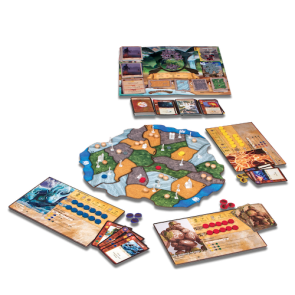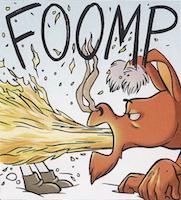The island strikes back.
Spirit Island features, as many games do, new settlers coming to a foreign land and setting up towns and cities. But unlike the vast majority of blithely colonial titles where this takes place, the players are not those settlers. Instead, you represent the native Dahan inhabitants and the animistic spirits of the island trying to throw off the invaders. And these spirits don't exactly like having these colonial exploiters trampling through their pristine wilderness. Using their natural power, the players' goal is to shove the invaders off the island through force and fear. And wind and rain. And fires, floods, killer bees, earthquakes, and anything else that will send them packing.P
Spirit Island hits all the right notes for a cooperative title and steers clear of many of the genre's pitfalls. Narratively, players are in a constant struggle from the very beginning as the invaders threaten to (and can) easily overwhelm them. Yet the game provides a slow ramp-up in power to deal with the escalating threat until the certainty of victory peeks through only at the final moments. But victory can seem also very elusive. What I'm saying is that the game is hard. Like, really hard - at least on your first few plays.
Each player takes on the role of one of the eight included spirits. All of them are different, but they are so much more than just a random player power and a portrait. Spirits operate through their cards and each spirit starts with a unique set of four that focuses on particular elemental or conceptual aspects. Some might be more defensive, protecting the land from the Invaders' blight. Others might be more destructive and straight up destroy their towns. Still others might sow fear and terror encouraging the Invaders to leave altogether or to avoid areas of the island.
But the engine runs on so much more than a simple set of cards. Each spirit also gets one "growth" action each turn - essentially a decision that balances card draws, card reclamation, power tokens, and perhaps other unique abilities. You get to choose one and that will dictate the pace for the rest of your turn. And most spirits have their own growth actions - meaning you'll have very different choices from your fellows. And, as the power of spirits increase, those power levels are represented differently. Some spirits are slow to acquire cards, but have immense raw power - so they can play the big cards. Others have an opposite approach. And all of this must be considered when choosing initial spirits as well as working out how to help each other most effectively.
Getting into the gameplay itself, the whole experience is satisfying. Each player chooses cards from their hand and plays them - up to a limit set by their current growth. Often, they have other abilities that can trigger depending on the color combinations of their cards. Once played, the cards are discarded until a growth action is used to pick them up again. So players are constantly trying to find the right combinations and play them at the right time. Once used, they'll be unavailable for at least a short while so planning for the turnaround is a key strategic concern.
And the timing of cardplay matters tremendously. Powers come in fast and slow varieties. Fast powers happen before the Invaders act and slow powers after. Which means that if you have a slow power, you have to think about where the Invaders will be after they expand or build. It's that future board state you're constantly playing against- proactive strategies are continually at odds with situational decisions, creating a tremendous amount of tension.
With cooperative games, there is always the potential for the "alpha gamer" problem. An experienced player who can basically run the game for everyone else and dictate their actions. But that issue is drastically diminished with Spirit Island. Each player has their own hand of totally unique spirit cards. And you gain more throughout the game. It's just not possible for one player to keep track of it all. And certainly not with sufficient familiarity that they can also match colors effectively and trigger secondary powers. This also forces every player to really get into the game and contribute to the discussion of how to proceed. There is very little specific advice anyone can give you. You have to figure it out and play your own turn.
Which isn't to say that the game is isolated. It's not. Just that the conversation is more about goals and who can achieve them, rather than about specific actions that particular players should take. And that coordination is essential. Spirit Island, on even its basic setting, is fairly difficult. It may take a few plays to figure out a winning formula. And from there, the game has numerous ways to make it harder. It comes with three unique adversaries that provide special rules for the invaders and can be played on 10 different levels. Plus four different scenarios that layer new concerns on top of the game. And you can mix and match them. This allows for a ton of customization and for the game's difficulty to grow with you.
The awesome gameplay carries the day, but its strong theme of is just delightful and refreshing. It turns the normal Eurocentric imperialist/expansionist notion of many titles on its head. Now you get to be the ones trying to stymie that conquest and development. Nevertheless, the game isn't preachy. It doesn't describe the spirits and Dahan as noble and true while the Invaders are evil outsiders looking to spoil natural beauty. Not at all. Instead, it's presented in a very neutral way. The Invaders want the land. The spirits don't want them there. Simple as that. So it's easy to enjoy the experience no matter your socio-political views. With that said, there are options for the invaders to represent specific European nations, but still there isn't necessarily a strict or specific judgment levied against them.
If there is a negative, it's that it is hard to play solo. Many gamers gravitate toward cooperative titles, in part, because they tend to work well in a group of one. Spirit Island, though, isn't the most accessible. The same complexity that eliminates the "alpha gamer" also makes it hard for one player to track everything in a solo game.
With that minor quibble aside, Spirit Island is an amazing title. You feel constantly challenged, you get unique experiences, you have customizable difficulty, and the refreshing pleasure of playing in a fairly unique thematic space. The hobby needs more games like Spirit Island and fewer clones of previously successful zombie shooters and dungeon crawlers.
 Games
Games How to resolve AdBlock issue?
How to resolve AdBlock issue? 































